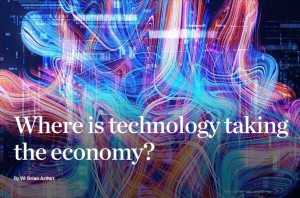We are creating an intelligence that is external to humans and housed in the virtual economy. This is bringing us into a new economic era—a distributive one—where different rules apply.
A year ago in Oslo Airport I checked in to an SAS flight. One airline kiosk issued a boarding pass, another punched out a luggage tag, then a computer screen showed me how to attach it and another where I should set the luggage on a conveyor. I encountered no single human being. The incident wasn’t important but it left me feeling oddly that I was out of human care, that something in our world had shifted.
That shift of course has been going on for a long time. It’s been driven by a succession of technologies—the Internet, the cloud, big data, robotics, machine learning, and now artificial intelligence—together powerful enough that economists agree we are in the midst of a digital economic revolution. But there is less agreement on how exactly the new technologies are changing the economy and whether the changes are deep. Robert Gordon of Northwestern University tells us the computer revolution “reached its climax in the dot-com era of the 1990s.” Future progress in technology, he says, will be slower.
So in what way exactly are the new technologies changing the economy? Is the revolution they are causing indeed slowing—or is it persistent and deep? And if so how will it change the character of the economy?
I argued a few years back that the digital technologies have created a second economy, a virtual and autonomous one, and this is certainly true. But I now believe the main feature of this autonomous economy is not merely that it deepens the physical one. It’s that it is steadily providing an external intelligence in business—one not housed internally in human workers but externally in the virtual economy’s algorithms and machines. Business and engineering and financial processes can now draw on huge “libraries” of intelligent functions and these greatly boost their activities—and bit by bit render human activities obsolete.
I will argue this is causing the economy to enter a new and different era. The economy has arrived at a point where it produces enough in principle for everyone, but where the means of access to these services and products, jobs, is steadily tightening. So this new period we are entering is not so much about production anymore—how much is produced; it is about distribution—how people get a share in what is produced. Everything from trade policies to government projects to commercial regulations will in the future be evaluated by distribution. Politics will change, free-market beliefs will change, social structures will change.
We are still at the start of this shift, but it will be deep and will unfold indefinitely in the future.
…
The realities of the distributive era
A new era brings new rules and realities, so what will be the economic and social realities of this new era where distribution is paramount?
1. The criteria for assessing policies will change. The old production-based economy prized anything that helped economic growth. In the distributive economy, where jobs or access to goods are the overwhelming criteria, economic growth looks desirable as long as it creates jobs. Already, unpopular activities such as fracking are justified on this criterion.
2. Free-market philosophy will be more difficult to support in the new atmosphere. It is based on the popular notion that unregulated market behavior leads to economic growth. I’ve some sympathy with this. Actual economic theory has two propositions. If a market—the airline market, say—is made free and operates according to a host of small-print economic conditions, it will operate so that no resources are wasted. That’s efficiency. Second, there will be winners and losers, so if we want to make everyone better off, the winners (big-hub airlines, in this case) need to compensate the losers: small airlines and people who live in remote places. That’s distribution, and overall everyone is better off.
3. The new era will not be an economic one but a political one. We’ve seen the harsh beginnings of this in the United States and Europe. Workers who have steadily lost access to the economy as digital processes replace them have a sense of things falling apart, and a quiet anger about immigration, inequality, and arrogant elites.
I’d like to think the political upheaval is temporary, but there’s a fundamental reason it’s not. Production, the pursuit of more goods, is an economic and engineering problem; distribution, ensuring that people have access to what’s produced, is a political problem. So until we’ve resolved access we’re in for a lengthy period of experimentation, with revamped political ideas and populist parties promising better access to the economy.
This doesn’t mean that old-fashioned socialism will swing into fashion. When things settle I’d expect new political parties that offer some version of a Scandinavian solution: capitalist-guided production and government-guided attention to who gets what. Europe will find this path easier because a loose socialism is part of its tradition. The United States will find it more difficult; it has never prized distribution over efficiency.
Brian Arthur is an external professor at the Santa Fe Institute and a visiting researcher at the System Sciences Lab at PARC (a Xerox company).
More: McKinsey Quarterly October 2017
